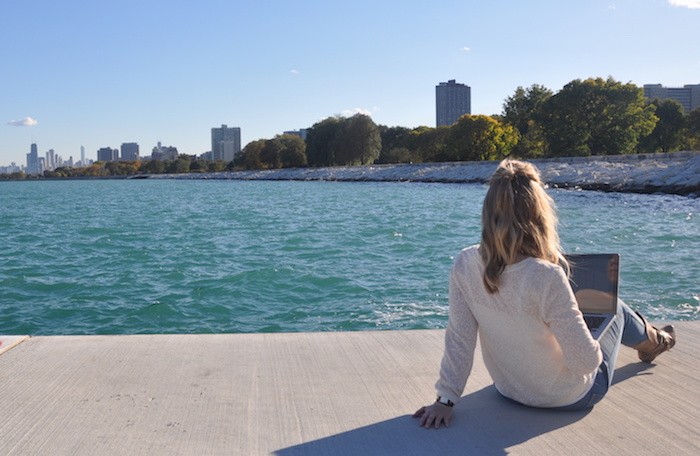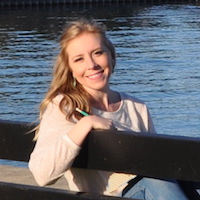
The day I received my final rejection letter is so clear in my mind.
It was my 23rd birthday. Friends from out of town had flown into Chicago to stay with us for a few days. It was freezing outside when I went down to get the mail. I reached in and pulled out a small stack of letters.
There it was: an envelope from the University of Hartford.
It was a little envelope. Not the oversized envelope stuffed fat with congratulations, forms, and pamphlets they send to accepted students. This was the thin, wimpy kind saying, “you know how you desperately want to be part of our doctorate program? Yeah, no.”
I walked back up to the apartment, forced a smile to my friends, motioned to the pile of mail and walked into the office.
And I cried. Hard.
Because everything I’d worked for over the past four years had been for nothing.
You see, I’m not the most—how should I say this?—chill person when it comes to what I want. If I want something, really want something, I go all in. Balls to the wall, as the kids would say.
And what I wanted from the minute I stepped foot in my freshman dorm to the minute I got that envelope was to become a therapist.
Up until that point, everything revolved around getting into grad school. The classes I took. The extra-curriculars I did. My (lack of) social life. My honors thesis research. All of it was centered around that one thing: someday being Whitney Ryan, PsyD. Dr. Ryan, like my dad. Different kind of doctor, but that’s what makes it cool, I thought.
I worked my buns off for four years. It paid off with a 3.94 GPA.
Which I celebrated by taking a freaking summer class.
Because a degree wasn’t quite enough. I wanted to get one more clinical psych class in.
That’s how hardcore I was about achieving this goal.
So when that final rejection letter came, I was standing on the Titanic as the last life vest went overboard. The University of Hartford was my safety school. I’d already watched the strong, sturdy lifeboats row away. But I still had that life vest. It wasn’t my preferred method of transportation to shore, but it would get me there.
But in that moment, someone snatched the vest from me and my hope was gone. I realized I wasn’t getting off the ship. I was sinking, and sinking without an identity. Being good at school was who I was. It felt like all of who I was. What was I going to do?
So I cried. For five minutes. And then it stopped.
It was a weird feeling. I remember being surprised when it happened. But I had this unexpected sense of calm.
It was this knowing that it would work out. That it would be okay.
(Or maybe I was just self-conscious that I was bawling my eyes out and making my friends in the next room wildly uncomfortable.)
The tears stopped in an instant.
In talking with my college advisors later, they all said the same thing: there’s no logical reason why you didn’t get in somewhere. The programs I applied to were competitive, but so was I. It was pure bad luck. Kismet, someone called it.
I don’t really believe in kismet. But the calm I felt in that moment felt an awful lot like it.
Fast-forward six-and-some years. And now?
I have this crazy amazing business where I build connections between people every day.
I mean, I’m writing this blog post from my mom’s house at the beach. On the couch. In my pajamas. At 6:23 a.m. Because I woke up with a story and couldn’t wait to share it.
This is what “work” looks like now.
I use my psychology education every single day as a copywriter. It helps me get inside the customer’s head like others can’t. It allows me to create copy that connects on a really deep level. A level that I couldn’t reach if I didn’t have the background I do.
It gives me integrity. I really care about the relationships I’m building with my copy. I know how precious connecting with another human being is. How giving them hope, giving them a solution, can change their lives. I don’t take that responsibility lightly.
It fuels me to give. I donate 10 percent of my profits to charity. Wanting to ease others’ pain hasn’t gone away. But I get to help in a different and really cool way now.
And it keeps me sane. Almost every entrepreneur I know didn’t take a straight path to where they are. This experience taught me that things work out, even if it’s not the way you thought they would. Life isn’t so rigid and serious.
It taught me that “failing” is like tripping over a root down a path in the woods. It’s not fun, it stings and you might be a little paranoid about the other roots you could trip over for a while.
But if you keep walking, eventually you’ll get somewhere awesome.
I didn’t re-apply for grad school the following year, as I originally intended. It just didn’t feel like the right thing anymore.
The blinders I had on working towards my goal shielded me from all the other possibilities out there for me. They kept me from getting the full picture and exploring other opportunities.
If you’re working hard toward achieving a goal, I hope you have that sense of big picture-ness that I didn’t. I hope that you can balance working your tuchas off with knowing failure isn’t really failure. If it doesn’t work out, it’ll still work out.
Wimpy envelopes can lead to some pretty sweet things.
What are you working toward right now? Do you need to readjust your blinders to see the full picture?
Have you ever had a failure like this? What did that failure lead you toward?
How do you approach your goals? Do you map out Plan B to fall back on? Or do you let life take the reins?
Author: Whitney Ryan
Image: author’s own
Editor: Renée Picard


 Share on bsky
Share on bsky




Read 19 comments and reply